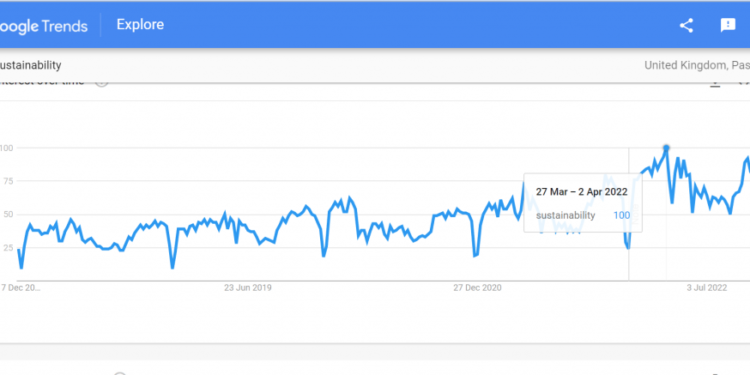The COVID-19 pandemic has given the world a wake-up call about the environment, and the UK is no exception. Recent social and political developments have increased public interest in sustainability, particularly in themes such as environmental protection, economic development, and climate concerns.
Nathan Gray, the head of sustainability at Reconomy, one of the UK’s top waste management companies, recently reviewed Google Trends data.
The term “sustainability” reached its all-time high in popularity in the UK in April 2022, scoring a perfect 100! A value of 100 indicates the peak popularity of the term and reflects that the interest of the people searching for the term reached its highest point in the last five years in 2022.
A sustainability-driven populace
UK citizens’ increasing awareness of the urgent need to protect the environment and support sustainable practices is apparent from the revelation.
The finding is also consistent with Google’s independent insights, which showed that climate change is now the second most concerning issue in the UK after the NHS.
Interestingly, smaller cities across the UK, such as Brighton, Cambridge, and Exeter, are leading the way regarding search interest represented by sustainability-related search patterns.
The increased interest in sustainability is reflected in the actions of UK citizens. 75% of UK consumers say that reducing plastics is an essential sustainable action for them. This indicates UK consumers are increasingly aware of the environmental and social impacts of their choices and are willing to make changes to support sustainable practices.
You can thank Gen Z for the growing buzz around sustainability. Forbes reports that two-thirds of Gen Z prioritise purchasing from environmentally conscious brands and are willing to pay a premium for ethically made products. They even expect their employers to be environmentally conscious, with 64% deeming it essential for them to “act on climate change.”
How businesses can respond and are responding
In response to consumer demand for sustainability, one-third of the UK’s largest companies have committed to reducing their carbon impact by incorporating sustainability into their operations. This group encompasses various industries, including financial services and retail.
A commonly adopted strategy is to give clear communication of a commitment to sustainability and showcase efforts through online content and social media. An example of this can be seen in AkzoNobel – a Dutch multinational company. The company brilliantly highlights its achievements, effectively communicated through an infographic.
A long way to go
The United Kingdom was the first major economy to set a legally binding target to achieve net zero greenhouse gas emissions, demonstrating its commitment to address the urgent threat of climate change. In line with this progress, much more must be done to decarbonize the UK economy by 2050.
A culture of delay must not hinder the UK’s environmental goals or its contribution to the global effort to prevent climate change.
The phased ban on single-use plastics is a positive step, but the fight against climate change is ongoing. While we have reached a turning point, there is still much work to be done to prevent global temperatures from rising above 1.5C by 2030. We can see the light at the end of the tunnel, but it’s not the end of the journey.
The post Revealed: UK Citizens’ Interest in Sustainability Hits 5-Year Record High first appeared on BusinessMole.
















